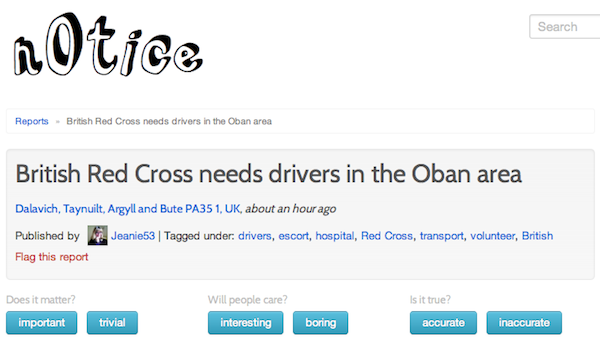
Today brings the public launch of n0tice, The Guardian’s new tool that brings a digital sensibility to the age-old practice of community messaging. (Think Craigslist, with SoLoMo sensibilities.) The service allows community members to create customized noticeboards (the So part) that are tailored to a particular geographic area (LoMo).
So far, says Matt McAlister, the Guardian’s director of digital strategy, “there have been loads of noticeboards created,” and “people are starting to be a little bit more creative about it” (using, say, customized logos and snazzy backgrounds for their sites).
The posts — and noticeboards are free both to create and to use — have ranged so far from the urgent (“Police have released an image of a man wanted in connection with a sexual assault on the Wilmslow Road“) to the less so (“Tonight is baking night at the superb Sofi’s bar in Leith“). And the service, via buttons, allows users to comment on the posts themselves, flagging: Does it matter? Will people care? Is it true?
But the real test of n0tice’s capabilities, of course, will be whether its noticeboards can penetrate their intended communities. “What we haven’t seen yet — and this is what today is about — is people promoting their noticeboards out to their communities,” McAlister notes. Today, public beta and all, is the first day that the community messages can actually live within communities. And much of the work that McAlister and his team have been doing since n0tice launched in private beta has involved optimizing its infrastructure, he says, “to make sure that it could support a lot more activity.” (For more on the back-end workings of n0tice, check out this nice explanatory post.)
What’s especially noteworthy, though, Craigslist analogies aside, is actually how post-Craisglisty n0tice is in its efforts to empower its users. Rather than offer a one-size-fits-all design, n0tice gives users tons of flexibility in terms of the customization of their community spaces: Not only will noticeboard administrators (whom the service, tellingly, refers to as “owners”) get to select and promote their own domains, but they’ll also be able to customize the aesthetics of their sites. And, most intriguingly, they can track the performance of their messages using n0tice’s social analytics tools (provided, in this case, by both Chartbeat and Google Analytics). With those tools, McAlister points out, “you can see how people are actually using your site.” They give every noticeboard creator the power normally enjoyed only by domain owners: to track, and understand, the behavior of sites’ users.
In addition, n0tice allows site owners to moderate community activity on their sites — allowing you, the user, to “try and encourage people to behave the way you want them to behave on your noticeboard.” Which makes a lot of sense — the whole point of the noticeboards is that they’re optimized for usage by a whole range of communities, with a whole range of behavioral standards — and will also be an interesting experiment to follow, from the perspective of community-driven moderation. As will, in fact, n0tice overall: a service that also serves as a great example of a newspaper thinking — and acting — more like a platform than a simple content provider.